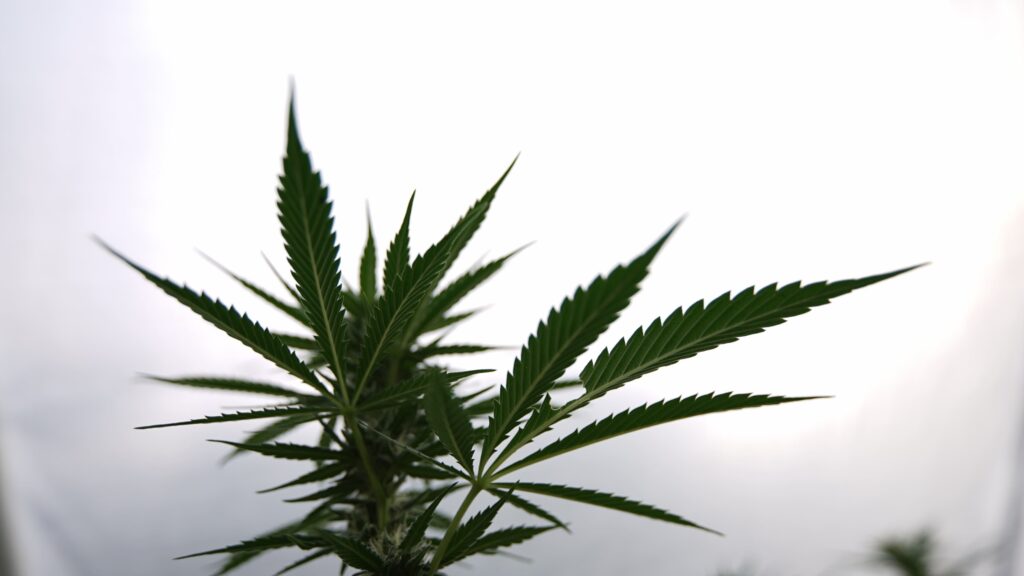As Oklahoma activists work to gather signatures for a 2026 poll initiative to legalize adult-use marijuana within the state, legislation enforcement leaders are elevating considerations about hashish.
Oklahomans for Accountable Hashish Motion (ORCA)—which has partnered with greater than 400 dispensaries and retailers throughout the state to hold their legalization poll petitions—says current anti-marijuana feedback from a police affiliation and state legislation enforcement company converse to the power of their effort.
At a press convention on Thursday, Moore Police Chief Todd Gibson, who serves as president of the Oklahoma Affiliation of Chiefs, stated “the residents of Oklahoma have already spoken out towards this challenge and have resoundingly stated we don’t need leisure marijuana.”
That was a reference to an earlier, 2023 initiative to legalize leisure hashish that voters rejected on the poll.
Gibson additionally criticized the implementation of the state’s medical marijuana program, which was permitted by voters in 2018, linking it to “a major improve in entry to our youth [and] impacts on our group with crime.”
“We’ve seen black market and worldwide crime enter Oklahoma and put a pressure on public security,” he stated. “Nowhere have I seen marijuana make higher communities and safer communities.”
Oklahoma Bureau of Narcotics and Harmful Medication (OBNDD) Director Donnie Anderson can be elevating alarm about marijuana. Whereas he didn’t explicitly encourage opposition to the 2026 initiative, he informed KOCO Information he has broader considerations about “organized crime” in Oklahoma.
“That’s what I’m having to take care of. You may have fuel and get a medical marijuana card. That’s fairly leisure for those who ask me,” he stated. “This isn’t about medical. I completely imagine there’s a spot and place for individuals. That’s not what’s occurring right here. Even the individuals who do that legally, we’re driving them out of enterprise.”
Jed Inexperienced, founding father of OCRA, informed Marijuana Second that the opposition from legislation enforcement earlier than the initiative is even licensed for poll placement and greater than a yr earlier than it’d doubtlessly get a vote is an indication that his marketing campaign has momentum.
“Now we have a state company and legislation enforcement organizations weighing in and opposing State Query 837 earlier than it’s even cleared for poll entry,” he stated. “That could be very atypical and really unprecedented, and we imagine that it really exhibits the power of our effort.”
“In the end, if these of us didn’t really feel threatened by what we’re doing, they’d not have attacked us six months earlier than there’s even doubtlessly a ‘sure’ marketing campaign,” he stated.
He additionally stated that, whereas the OBNDD director didn’t instantly search to affect voters a method or one other, the state company did use its Fb web page to promote an article in regards to the press convention with the police chief, which may quantity to a “violation of use of state sources.”
“As a result of whereas the director was not essentially [opposing it himself] they promoted a one-sided piece towards 837,” he stated. “We’ve reached out to the Oklahoma State Ethics Fee to ask them to supply slightly little bit of readability for ourselves and the company to ensure that everybody is obvious on what’s and what’s not allowable.”
“Presumably these statements by native legislation enforcement are a response to our group surpassing 400 signature gathering areas right here throughout the state,” he stated.
To assist facilitate the signature gathering course of, ORCA has additionally launched an interactive map that helps potential supporters find the companies—a mixture of present medical hashish dispensaries and different retailers, from eating places to tattoo parlors to liquor shops—which are retaining petitions on-site.
There are challenges distinctive to this election cycle, as earlier this yr Gov. Kevin Stitt (R) gave ultimate approval to laws that some advocates fear will inhibit future citizen-led coverage modifications, together with hashish reform.
The legislation places extra necessities on initiative “gist” language that voters see on the poll and in addition revise insurance policies round signature gathering to make it so petitioners may solely submit signatures from as much as 11.5 % of registered voters in a single county for statutory proposals and 20.8 % for constitutional measures. The legislation is at present being litigated for causes unrelated to the precise hashish proposal.
For its preliminary signature gathering marketing campaign, ORCA will probably be centered on making certain that rural areas are arrange in order that advocates will be capable of monitor them as a “baseline.” After that time, they’ll goal the state’s bigger cities like Oklahoma Metropolis and Tulsa.
ORCA might want to submit the required 172,993 signatures by November 4, after which level the secretary of state’s workplace might want to validate them. Then there will probably be a 90-day window for any authorized challenges to the measure. If the marketing campaign clears that barrier, it’ll seem on the November 2026 poll.
Inexperienced beforehand stated that one of many key variations between the initiative his organization is pushing and the one which failed on the poll in 2023 is that it accounts for considerations about licensing guidelines. Many have criticized the rollout of the state’s medical marijuana legislation, which led to a dramatic proliferation of dispensaries, and Inexperienced stated the failed adult-use measure successfully duplicated that licensing scheme.
Right here’s what ORCA’s newest marijuana legalization initiative would accomplish:
- It will permit adults 21 and older to buy and possess as much as eight ounces of hashish for private use. They may additionally develop as much as 12 crops and possess what’s harvested, and they’d be capable of have as much as one ounce of hashish concentrates.
- The proposed constitutional modification would additionally present that Oklahoma banks wouldn’t be penalized merely for servicing state-licensed hashish companies.
- Additional, the initiative consists of protections to make it so any adults could be shielded from being penalized with respect to “healthcare, housing, employment, public help, public profit, parental proper, instructional alternative, extracurricular exercise” and in addition “licensure or licensed exercise” comparable to firearm possession and driving rights on account of any authorized hashish exercise.
- As a part of these protections, the presence of THC metabolites in an individual’s system couldn’t be used as proof of impairment.
- Native governments wouldn’t be permitted to impose bans on the marijuana residence cultivation, and any laws they set on the exercise couldn’t be “unduly burdensome.” Moreover, no public ordinances on public smoking for marijuana could possibly be extra restrictive than what’s at present in place for tobacco.
- Present medical hashish dispensaries, in addition to any new retail licensees, would be capable of begin promoting to grownup customers beginning 60 days after the measure’s enactment. After 180 days, they might begin delivering hashish merchandise to adults.
- The identical state departments that oversee the present medical hashish program could be accountable for regulate the adult-use market.
- A ten % excise tax could be imposed on adult-use marijuana merchandise, and the initiative stipulates that the legislature could be empowered to lower that tax charge however not elevate it.
- Income from these tax {dollars} would go towards the state common fund (40 %), in addition to county governments (30 %) and municipal governments (30 %) the place retail gross sales occurred. For unincorporated jurisdictions, income could be cut up evenly, with 5o % for the overall fund and 50 % for the counties.
- Sixty days after the measure’s enactment, the tax charge on marijuana for registered hashish sufferers could be eradicated.
- It additionally states that state-licensed marijuana companies couldn’t be prevented from participating in interstate commerce if there’s a change in federal legislation, or a courtroom motion, allowing such exercise. If that occurs, the legislature could be approved to put as much as a 3 % wholesale tax on hashish exported past state traces.
In the meantime in Oklahoma, lawmakers in March superior a invoice aimed toward defending gun rights of state-registered medical marijuana sufferers, though federal legislation nonetheless bars hashish customers from proudly owning firearms no matter their affected person standing.
One other state invoice filed in January by a GOP legislator would criminalize using medical hashish throughout being pregnant.
Photograph courtesy of Chris Wallis // Facet Pocket Pictures.



